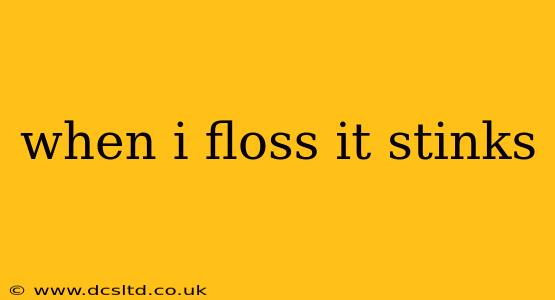Flossing is crucial for oral hygiene, but sometimes, that clean feeling is accompanied by a less-than-pleasant surprise: a foul odor. If you've ever wondered, "Why does my floss smell bad?", you're not alone. This unpleasant experience isn't necessarily a sign of poor oral hygiene, but rather a signal that something might be amiss in your mouth. Let's delve into the reasons behind this stinky situation and explore solutions to combat it.
What Causes Bad Breath After Flossing?
The unpleasant smell you experience after flossing is often a result of bacteria and food particles trapped between your teeth. These particles, normally hidden from your toothbrush, are disturbed during flossing, releasing volatile sulfur compounds (VSCs) – the primary culprits behind bad breath. These compounds are produced as bacteria break down food debris. The intensity of the smell depends on the type and amount of food caught between your teeth, as well as the amount of bacteria present.
Why Does Flossing Bring Out a Bad Smell?
Flossing dislodges these hidden particles and bacteria, bringing them into contact with your saliva and releasing the VSCs into the air, leading to that unpleasant odor. Think of it like uncovering a hidden, decaying piece of food—the smell wasn't there before you disturbed it, but now it's released.
Addressing the Stinky Situation: Solutions and Prevention
Fortunately, combating bad breath after flossing isn't difficult. Here are some effective strategies:
1. Improve Your Flossing Technique:
Ensure you're flossing correctly. Improper technique might not effectively remove all the food particles and bacteria, leaving remnants to fester and contribute to the smell. Use gentle, C-shaped movements to clean between teeth thoroughly.
2. Increase Flossing Frequency:
Flossing once a day is a good start, but for individuals prone to food impaction or experiencing persistent bad breath, flossing twice a day might be necessary. This proactive approach helps prevent the buildup of bacteria and food particles.
3. Use Antimicrobial Mouthwash:
Rinsing with an antimicrobial mouthwash after flossing can help kill remaining bacteria and further reduce the risk of bad breath. Choose a mouthwash containing ingredients like chlorhexidine or cetylpyridinium chloride, known for their antibacterial properties. However, always consult your dentist before using a new mouthwash, especially if you have existing health conditions.
4. Pay Attention to Diet:
Certain foods, such as garlic, onions, and strongly-flavored spices, can contribute to bad breath. While flossing helps remove food debris, these potent aromas can linger, even after flossing. Consuming these items in moderation may help.
Addressing Underlying Dental Issues
Sometimes, persistent bad breath after flossing, along with other symptoms like bleeding gums or gum pain, might indicate a more serious underlying dental issue such as:
- Gingivitis: Inflammation of the gums caused by bacterial plaque buildup.
- Periodontitis: A more advanced form of gum disease that can damage the gums and supporting structures of the teeth.
- Dental Cavities: Holes in the teeth, often caused by bacterial acids.
If you experience persistent bad breath even with diligent flossing and oral hygiene, it's crucial to schedule a visit with your dentist to rule out any underlying dental problems.
Other Questions About Flossing and Bad Breath:
Is it normal for my floss to be stained after flossing?
Yes, it's completely normal for your floss to be stained after flossing, especially if you haven't flossed in a while. The staining is often from food particles, plaque, and bacteria that have been removed from between your teeth.
Can I use different types of floss to reduce bad breath?
Experimenting with different floss types (e.g., waxed, unwaxed, flavored) might help you find one that suits your needs and preference. Some people find that flavored floss masks the smell better, but the core issue is proper cleaning, not masking the odor.
My breath still smells bad even after flossing and brushing. What should I do?
Persistent bad breath despite good oral hygiene could indicate an underlying medical condition. Consult your dentist or physician to determine the root cause. This could be related to dietary habits, health conditions, or even medication.
Remember, consistent flossing is vital for maintaining excellent oral health. If the smell persists despite following these suggestions, consulting a dental professional is recommended to address potential underlying issues.
